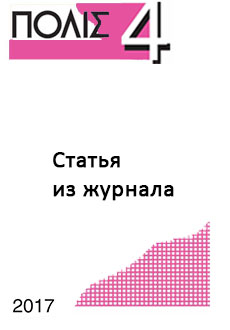Online shop of "Polis. Political Studies" Journal
We in the world, the world in us
Tsapenko I.P., Monusova G.A. Integration Capacity of Ethno-Cultural Diversity in European Societies. – Polis. Political Studies. 2017. No 4. P. 90-105 (In Russ.) .
150 руб.
immigration; ethno-cultural diversity; interethnic and interreligious relations; ethnic conflicts; identity; integration; interculturalism; European social survey.
The article offers an analytical picture of the ethno-cultural shifts taking place in the developed regions of the world, socio-political impact of those shifts, prospects and framework for the realization of integration potential of diversity. These topics are analyzed from the standpoint of the identity approach in the context of theories of conflict and contact and using microdata of the European Social Survey. It is shown that global migration increases ethnic and cultural heterogeneity of host societies which is becoming more and more a powerful factor of the decline of trust, cohesion and stability of these societies. The migration crisis in the EU has increased the threat of translating the ethno-cultural contradictions into a destructive conflict of identities. Meanwhile following the logic of migration processes and their effects development, the transient nature of the escalation of intercultural confrontation may be assumed. The factors facilitating positive interethnic interaction are identified. The article provides examples of diversity contributing to the alleviation of intercultural tensions and transformation of the divided communities into social organisms operating as “E Pluribus Unum”. The realization of the positive potential of diversity requires an efficient model of intercultural relations based on the recognition of the existence of ethnic and other differences within society and focused on finding the foundations for the rapprochement of cultures which is different from multiculturalism and assimilation. Given that as omniculturalism, emphasizing the commonality of human nature, and polyculturalism, representing cultures and nations as a product of overlapping histories of different ethnic and racial groups and their relationships, could generate contradictory effects, interculturalism seems to be more promising. This approach is focused on searching common interests of people and stimulating an intercultural dialog from below. Though intercultural initiatives are not numerous, they have already given a good account, requiring the search of instruments of practical implementation of such practices at the subnational and especially national levels.
 English
English Русский
Русский

Reviews
There are no reviews yet.